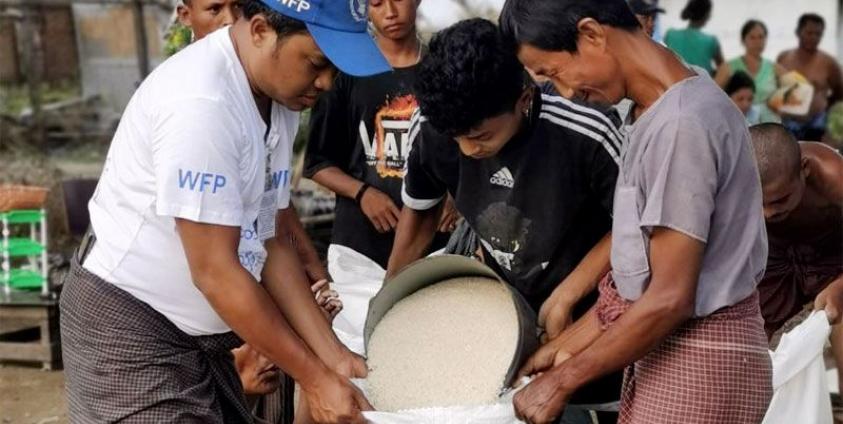On June 19th, the United Nations Office for the Coordination of Humanitarian Affairs (UNOCHA) released a statement highlighting that the Military Council has persistently maintained restrictions on the freedom of movement for organizations, seeking to deliver vital humanitarian assistance to individuals impacted by the cyclone in Rakhine State.
The statement said that retraction of initial approval for cyclone distribution and transportation plans, and the temporary suspension of existing travel authorizations (TAs) for humanitarian organizations in Rakhine State, has impacted the humanitarian response across the region.
“This sudden decision exacerbated the already dire living conditions of the cyclone-affected population, as heavy rains and flooding from the monsoon season continue to impact areas already severely affected by the cyclone”, UNOCHA stated.
On June 8th, in line with directives from the Military Council issued a day prior, INGOs, NGOs, and CSOs were subjected to an indefinite restriction on freedom of movement within Rakhine State.
The Military Council's travel ban on humanitarian organizations has faced considerable criticism, particularly due to its timing, coinciding with the urgent need for aid among cyclone-affected populations.
Despite the announcement made by Rakhine State authorities under the Military Council on June 11th, stating that NGOs would be permitted to carry out regional development projects based on pre-approved agreements, humanitarian organizations continue to face significant limitations on their freedom of movement in practice.
On June 12th, the Resident Coordinator and Humanitarian Coordinator ad interim, Ramanathan Balakrishnan, released a statement urging the authorities to grant humanitarian organizations permission to operate in Rakhine State. as outlined in the initial agreements.
NGOs seeking to deliver humanitarian aid in Rakhine State have faced challenges in obtaining timely approval for their TAs from the state authorities, leading to significant difficulties in their operations.
"In order to obtain travel authorizations (TAs), the Military Council has explicitly stated that we must submit written applications following the prescribed rules. However, despite our diligent efforts to comply and apply, we have been unable to secure the necessary permissions”, an NGO staff told DMG.
The approval of the distribution and transportation plans for the Cyclone Mocha response in Rakhine and Chin remains pending, according to UNOCHA.
A humanitarian aid worker, assisting the individuals impacted by the storm, strongly condemned the Military Council's actions, citing them as a violation of human rights against the people of Rakhine State. The aid worker expressed concern over the various forms of restrictions and harassment imposed on humanitarian aid organizations.
"If they have declared themselves as the governing authority, it is their responsibility to take active leadership in the relief efforts. It is disheartening to see that the very organizations providing assistance, are facing severe constraints due to their actions. In our case, when we venture into rural areas for rescue operations, we must exercise extreme caution to avoid encounters with the Military Council soldiers. Any inadvertent contact could result in arrest and further complications for us”, he explained.
Despite the humanitarian access restrictions, aid organizations have been delivering vital assistance to cyclone-affected communities where they have authorizations and supplies, UNOCHA said.
According to the Arakan Army (AA), Cyclone Mocha, which struck Rakhine State on May 14th, has affected a staggering number of 1,547,761 (over 1.5 million) individuals in the region. Certain remote rural areas and refugee camps impacted by the cyclone continue to face significant challenges in accessing essential food and supplies, locals said.
" Ma May Su Hlaing, a resident of Sae Di Pyin refugee camp in Rathedaung Township told DMG,
“In the camp where we currently reside, all the toilet facilities have been completely destroyed. This poses a significant inconvenience, particularly for the female residents. Meanwhile, the ban imposed by the Military Council on aid organizations has further exacerbated our already dire circumstances, leaving our livelihoods in even greater jeopardy”.
According to the AA's report, at present, only 30 percent of the individuals affected by the cyclone have received aid from international organizations, civil organizations, and private donors. Shockingly, the remaining 70 percent have not received any assistance or supplies.







